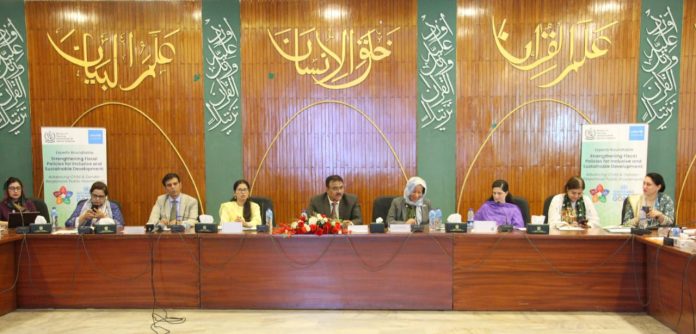ISLAMABAD: Experts at a pre-budget dialogue on Wednesday urged the government to introduce inclusive fiscal reforms in the upcoming budget to empower children and women, who remain largely overlooked in the country’s fiscal discourse.
The event, titled “Strengthening Fiscal Policies for Inclusive and Sustainable Development: Advancing Child and Gender-Responsive Public Investments,” was jointly organized by the Ministry of Planning, Development and Special Initiatives, UNICEF Pakistan, and the Sustainable Development Policy Institute (SDPI), according to a press release.
The dialogue focused on aligning Pakistan’s fiscal strategy with inclusive growth objectives and brought together government officials, economists, development partners, and civil society representatives to discuss how to reorient fiscal frameworks toward equity, sustainability, and inclusive development.
Speakers highlighted Pakistan’s budget deficit exceeding 6.8% of GDP and a debt-to-GDP ratio over 70%, stressing the urgent need to safeguard and expand public investments in health, education, nutrition, and social protection. They noted that despite tax revenues falling below 10% of GDP, investments in children and marginalized communities must not be delayed.
UNICEF’s Public Expenditure Reviews (PERs) revealed a gap between policy goals and actual allocations, with education spending in Sindh falling to 1.8% of GDP. Speakers emphasized the need for fiscal policies aligned with the equity and empowerment pillar of the government’s Uraan Pakistan program, prioritizing digital literacy, green skills, education access, and civic engagement for women, youth, and underserved populations.
The event included a plenary session and three panel discussions. In his opening remarks, Dr. Abid Qaiyum Suleri, Executive Director of SDPI, noted that Pakistan is navigating two IMF programs, the Extended Fund Facility (EFF) and the Resilience and Sustainability Facility (RSF), with differing priorities. He called on policymakers to integrate climate tagging in fiscal planning to empower girls and adolescents through inclusive and climate-aligned strategies.
UNICEF Representative Sharmila Rasool emphasized human capital development, noting Pakistan’s Human Capital Index stands at 0.41. She said urgent reforms in tax equity and expenditure are required, and that the regressive tax system places a disproportionate burden on the poor. Rasool reiterated UNICEF’s support for Pakistan’s efforts to improve equity-focused spending, especially for children and adolescents.
Delivering a keynote address on behalf of the Federal Minister for Planning, Dr. Muhammad Ali Talpur, Joint Chief Economist at the Ministry of Planning, said fiscal policy must act as a tool for social justice. He announced the formation of a high-level technical working group to explore reallocation strategies, identify new fiscal opportunities, and reinforce Pakistan’s commitment to inclusive development under the Sustainable Development Goals.
During the first panel, Dr. Lutf ur Rehman, Director of Research, Planning and Development Department, Government of Balochistan, highlighted issues including nonfunctional girls’ schools and inadequate funding for child services. Pir Aimal, Assistant Chief IDS, Planning and Development Department, Khyber Pakhtunkhwa, cited challenges in tribal regions and said the province is focusing on social sector financing under Uraan Pakistan.
A Sindh government representative said the provincial budget aims to balance flood recovery with long-term social investments.
Ayesha Javaid from the Ministry of Finance chaired the second panel on macroeconomic context, tax justice, and fiscal constraints. She noted that Pakistan’s federal budget is now gender responsive and acknowledged the institutional work needed to integrate gender in fiscal planning.
Dr. Ashfaq Hassan Khan, Head of NUST’s Policy Studies Department, said Pakistan’s budget deficit is driven by rising interest payments. He called for a freeze on new infrastructure projects and privatization of loss-making state enterprises to ease fiscal pressure.
Tobias Becker of the World Bank shared findings from the Uraan Pakistan initiative, showing that the poor contribute disproportionately to tax revenue while receiving fewer public benefits. He criticized large subsidies in electricity and higher education and advocated for a shift toward primary education and equitable subsidies.
In the third session, Dr. Sajid Amin Javaid, Deputy Executive Director at SDPI, said gender is often an afterthought in financial policy. He proposed a dedicated public finance framework incorporating gender, climate, and private-sector financing and suggested the creation of a body to mobilize social investments and modernize industrial and regulatory systems.
Saima Bashir, Member Social Sector, Planning Commission, concluded the dialogue by highlighting signs of macroeconomic recovery. She said real GDP growth stands at 2.38% and inflation has declined, but poverty remains high and 25.6 million children remain out of school.
Bashir said inclusive fiscal reform is not a cost but an investment, and announced that a working group would explore reallocations and financing models targeting children, youth, and women.




